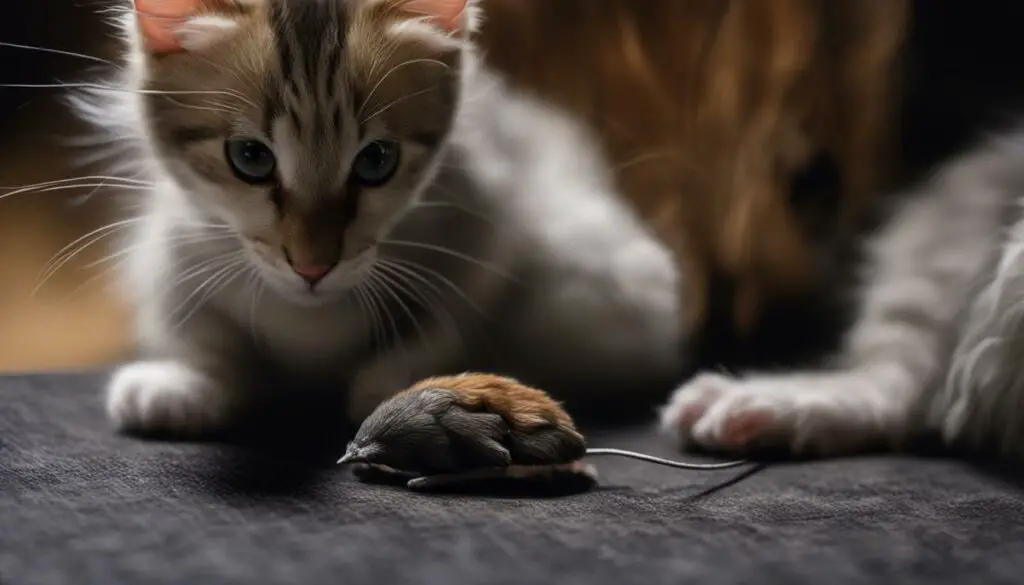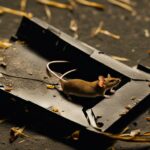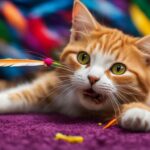Many cat owners have experienced the scenario where their cat catches a mouse but doesn’t kill it. This behavior can be attributed to various factors, including feline hunting instincts and the cat’s relationship with the mouse.
Key Takeaways:
- Cats have natural hunting instincts that drive them to chase and capture prey.
- Some cats engage in playful behavior with mice without intending to kill them.
- Individual cat behavior and past experiences can influence their interaction with mice.
- Stray or feral cats may retain their hunting skills but choose not to kill mice.
- Cats may have an awareness of the health risks associated with mice.
Feline Hunting Instincts and Behavior
Cats are natural hunters, driven by their feline instincts to chase and capture prey. This behavior is deeply rooted in their ancestry as wild predators and is an essential part of their nature. When a cat catches a mouse, it may not immediately kill it, but instead engage in playful behavior.
Play is an important aspect of a cat’s hunting behavior. When a cat catches a mouse, it may bat it around, pounce on it, and release it, repeating the process. This playful interaction allows the cat to satisfy its hunting instincts and engage in an enjoyable activity. While the cat’s intention may not be to kill the mouse, this behavior is still a manifestation of its natural hunting instincts.
“Play is an important aspect of a cat’s hunting behavior.”
It’s important to understand that each cat has its own unique behavior when it comes to interacting with prey. Some cats may choose to kill mice when they catch them, while others may prefer a non-lethal encounter. This variation in behavior can be influenced by factors such as the cat’s personality, upbringing, and previous experiences. For some cats, the thrill of the chase and the playfulness with the mouse is more enticing than the act of killing it.
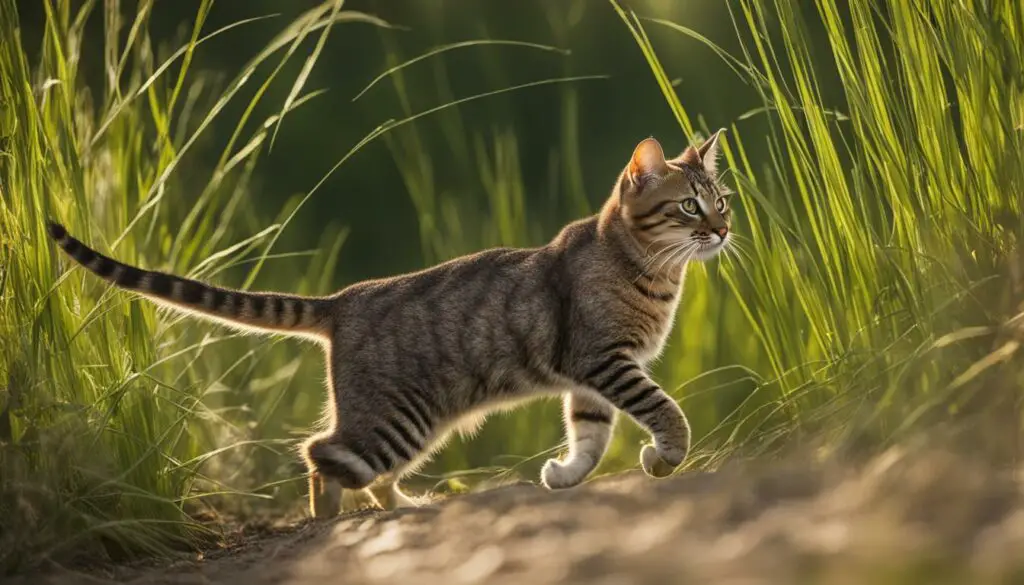
The Role of Hunting in a Cat’s Life
Hunting behavior is not only instinctual for cats but also serves important purposes in their lives. Engaging in hunting allows cats to exercise, improve their coordination and agility, and fulfill their natural predatory needs. It provides mental stimulation and prevents boredom, contributing to their overall well-being. While cats may not always kill the prey they catch, the act of hunting itself remains an integral part of their existence.
The Playful Nature of Cats
Cats are known for their playful nature, and their interactions with mice can be seen as a form of play. When a cat catches a mouse, it may engage in a series of playful behaviors that mimic its hunting instincts. This can include holding the mouse in its mouth, releasing it, and then pouncing on it again, repeating the process. The cat’s goal is not necessarily to kill the mouse, but rather to satisfy its natural hunting instincts and engage in an enjoyable activity.
This playful behavior can be attributed to cats’ innate instincts as natural hunters. Cats have evolved from their wild ancestors who relied on hunting for survival, and these instincts are deeply ingrained in their behavior. Even domesticated cats who are well-fed and cared for may still exhibit these hunting behaviors and enjoy the thrill of the chase.
While some cats may choose to kill the mice they catch, others may opt for a non-lethal interaction. Each cat has its own unique personality and preferences, and this can influence their behavior towards mice. Some cats may simply enjoy the chase and play with the mouse without causing harm. This playful interaction can provide mental and physical stimulation for the cat, allowing them to fulfill their hunting instincts in a safe and controlled environment.
| H3: The Playful Behaviors of Cats | H3: Benefits of Playful Interaction |
|---|---|
|
|
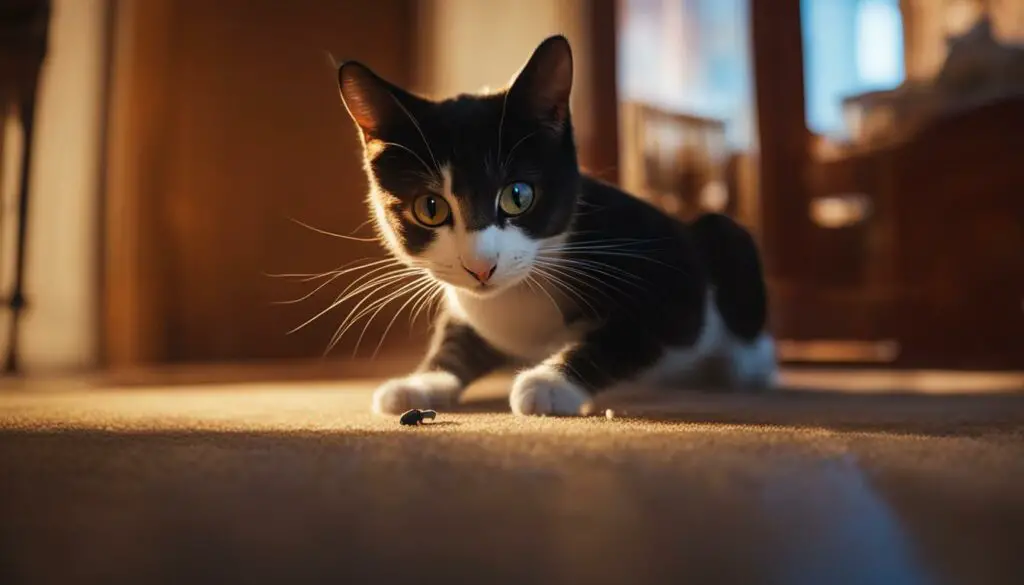
In conclusion, the playful nature of cats is evident in their interactions with mice. Cats engage in playful behaviors that mimic their hunting instincts, providing them with mental and physical stimulation. This playful interaction allows cats to fulfill their natural hunting instincts and enjoy an activity that brings them joy and satisfaction.
Individual Cat Behavior
When it comes to the interaction between a cat and a mouse, each feline has its own unique behavior and preferences. While some cats may instinctively choose to kill the mouse they catch, others may opt for a non-lethal interaction. This individual behavior can vary depending on factors such as the cat’s personality, upbringing, and previous experiences.
Some cats simply enjoy the thrill of the chase and may play with the mouse without causing any harm. They may bat the mouse around, release it, and then pounce on it again, repeating the process. For these cats, it’s all about the excitement and engagement rather than the intention to kill.
It’s important to remember that cats are individuals with their own instincts and preferences. Just as some humans have different approaches to certain situations, cats too display a range of behaviors. So, if your cat catches a mouse but doesn’t kill it, it’s likely because they have their own unique way of dealing with their prey.
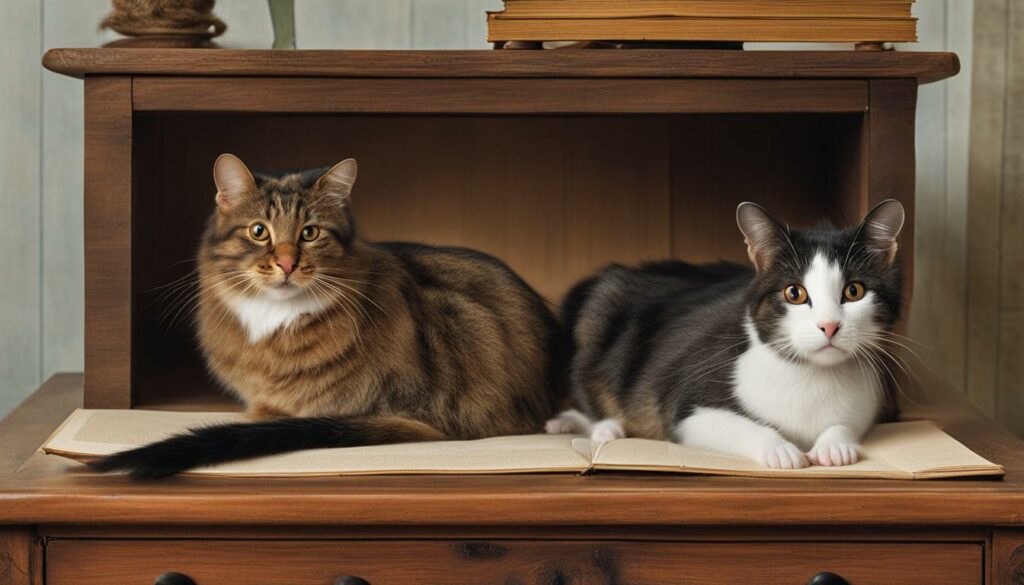
Understanding Your Cat
Observing your cat’s behavior and understanding their unique preferences can help you better respond to their needs. Some cats may have a higher prey drive and may be more likely to kill the mice they catch. For these cats, it’s important to provide alternative sources of stimulation, such as interactive toys, to redirect their hunting instincts.
On the other hand, if your cat prefers to engage in non-lethal play with mice, you can ensure their safety by keeping the mice out of reach when they are not being supervised. This can be achieved by setting up secure barriers or using humane traps to catch and release the mice elsewhere.
Remember, every cat is different, and their behavior towards mice may vary. By understanding and respecting your cat’s individual behavior and needs, you can provide them with a fulfilling and engaging environment.
Stray Cats and Hunting Skills
When it comes to cat and mouse interaction, understanding the behavior of stray cats can provide valuable insights. Stray cats, who were once feral or lived in outdoor environments, often rely on hunting for survival. These cats have honed their hunting skills to catch prey efficiently.
However, it’s interesting to note that even though stray cats have the ability to kill mice, they may choose not to. This could be due to a variety of reasons, including their past experiences and the availability of other food sources. For stray cats, catching a mouse and engaging in a playful interaction can be a way to relive their wild experiences and engage in their natural behaviors.
This behavior is reminiscent of their days in the wild when they needed to conserve energy and hunt strategically. By catching but not killing the mouse, stray cats can save their energy for other necessary activities, such as hunting for food or defending their territory.
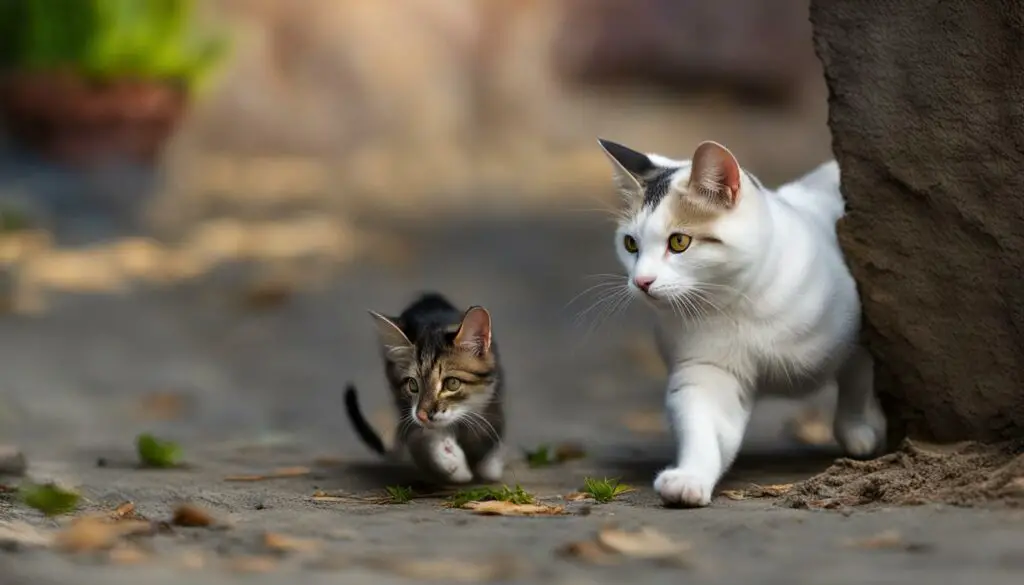
Stray cats’ decision to not kill mice they catch can also be influenced by their relationship with humans. Strays that have been domesticated or have had positive interactions with humans may have developed a stronger bond with their human caretakers. As a result, they may prioritize the human-animal relationship over fulfilling their hunting instincts entirely.
In conclusion, stray cats possess impressive hunting skills but may choose not to kill mice they catch. Their decision to engage in playful interactions with mice can be influenced by their past experiences, the availability of food sources, and their relationship with humans. Understanding their behavior can help cat owners appreciate the complex interactions between cats and prey animals and provide appropriate care for their feline companions.
Potential Reasons for Not Killing Mice
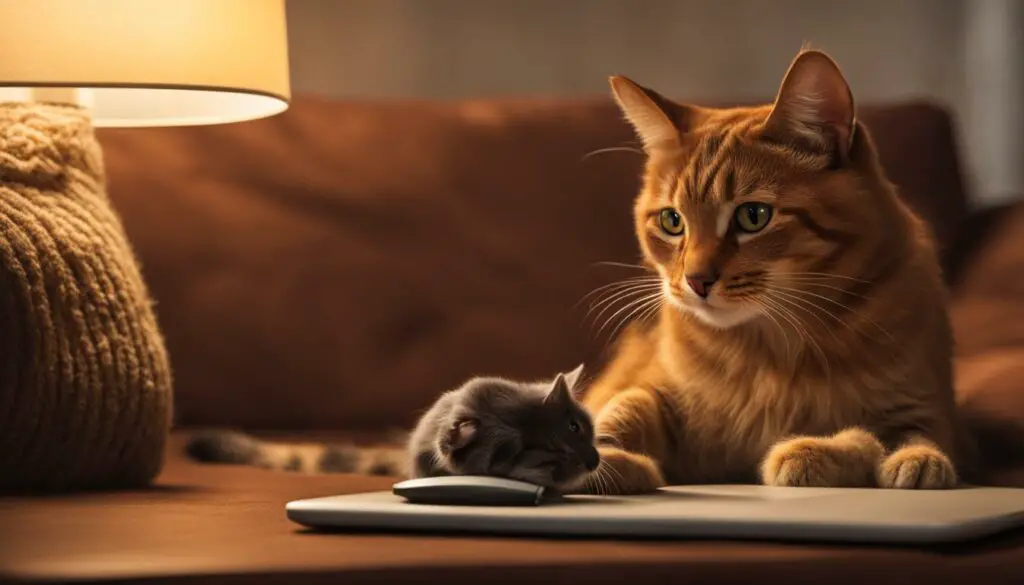
There are several potential reasons why a cat may choose not to kill a mouse. One reason could be that the cat has not learned the skill of killing mice and is more interested in playful interaction. Cats, being curious and natural hunters, may simply enjoy the thrill of the chase and the engaging activity of interacting with a mouse without causing harm.
Additionally, some cats exhibit a more humane hunting behavior, where they catch prey without causing harm. This behavior can be attributed to their individual personality and instincts. It is possible that these cats have a heightened awareness of the mouse’s vulnerability and choose not to inflict harm. This can be seen as a compassionate approach to hunting, where the cat satisfies its hunting instincts without causing unnecessary suffering.
Another potential reason for not killing mice is that cats may have a natural aversion to certain textures or tastes associated with the mouse. Cats are known for their discerning palates and may find the taste or texture of a mouse unappealing. In such cases, the cat may choose to catch the mouse for the sake of the chase but refrain from consuming it because it does not meet their culinary preferences.
The Role of Socialization
Socialization plays a crucial role in shaping a cat’s behavior towards mice. Cats that have been exposed to positive experiences with humans, such as being raised in a loving home environment, may be less inclined to exhibit aggressive hunting behavior towards mice. Conversely, cats that have had limited socialization or negative experiences may be more likely to engage in aggressive hunting behavior.
| Potential Reasons for Not Killing Mice | Description |
|---|---|
| Unlearned Skill | Cats may not have learned how to kill mice or may be more interested in playful interaction. |
| Humane Hunting Behavior | Some cats catch prey without causing harm, possibly due to heightened awareness or compassion. |
| Texture or Taste Aversion | Cats may find the texture or taste of a mouse unappealing, leading them to refrain from consuming it. |
| Socialization | Cats’ behavior towards mice can be influenced by their socialization experiences and interactions with humans. |
I believe that cats have the ability to make conscious choices in their interactions with mice. They may understand that they have the power to harm, but choose not to. It’s fascinating to see how these creatures navigate their instincts and display varied hunting behaviors.
By considering these potential reasons for a cat’s choice not to kill a mouse, we can gain a deeper understanding of the complex nature of feline hunting behavior. Every cat is unique, and their individual personalities and instincts shape how they interact with their prey. Whether it’s due to playfulness, compassion, or personal preferences, cats can showcase a range of hunting behaviors that reflect their innate nature as skilled and adaptable hunters.
Feline Awareness of Mouse Health Risks
When it comes to the interaction between cats and mice, feline hunting instincts play a significant role. However, it is interesting to note that cats may have an innate awareness of the potential health risks associated with mice. This awareness influences their decision to play with mice without killing them.
Cats possess a remarkable ability to sense and detect subtle changes in their environment. They can detect the odor of mice and may associate it with the presence of diseases or parasites that mice can carry. This understanding could be a contributing factor in their decision to engage in non-lethal interactions with mice.
The behavior of playing with mice instead of killing them can be seen as a form of self-preservation. Cats prioritize their well-being and instinctively avoid consuming prey that could potentially transmit infections. By engaging in playful interactions, cats can still fulfill their natural hunting instincts while minimizing the risk to their own health.
In conclusion, cats’ awareness of mouse health risks is an intriguing aspect of feline behavior. It showcases their ability to assess potential dangers and make informed decisions. Understanding this aspect of cat behavior can help pet owners appreciate the complexity and intelligence of their feline companions.
| Benefits of Feline Awareness of Mouse Health Risks |
|---|
| 1. Minimizes health risks to cats |
| 2. Allows cats to engage in natural hunting behaviors without compromising their well-being |
| 3. Preserves the ecological balance by keeping mice populations in check |
| 4. Reduces the transmission of diseases from mice to cats and humans |
Alternatives to Killing Mice
When it comes to cat and mouse interaction, not all encounters result in a fatal ending for the prey. Cats have a natural instinct to hunt and catch mice, but some cats may choose to engage in non-lethal interactions instead of killing their prey. Understanding these alternatives can help cat owners better manage and appreciate their feline companions’ hunting behaviors.
For some cats, the act of catching and playing with mice serves as a way to satisfy their hunting instincts without the need to kill. This playful interaction allows cats to exercise their physical and mental abilities while engaging in a natural behavior. To encourage this behavior without harming mice, cat owners can provide their pets with alternative toys and activities that simulate hunting experiences. Interactive toys, such as feather wands or puzzle games, can be a great way to redirect a cat’s hunting instincts.
| Potential Alternatives to Killing Mice | Description |
|---|---|
| Interactive Toys | Provide your cat with toys that mimic the movements of prey animals, such as feather wands or laser pointers. This can redirect their hunting instincts towards non-lethal play. |
| Puzzle Games | Engage your cat’s mind by offering puzzle games that require problem-solving skills to retrieve treats. This not only keeps them mentally stimulated but also simulates the chase and capture aspect of hunting. |
| Outdoor Space | If you have a safe and secure outdoor area, create an enriched environment where your cat can explore and hunt for insects or chase moving objects, providing a natural outlet for their hunting instincts. |
While these alternatives can help satisfy a cat’s hunting instincts without harming mice, it’s important to note that not all cats will be interested in playing with mice or toys. Each cat has its own unique preferences and behaviors, so it’s essential to observe and understand your cat’s individual needs and provide appropriate outlets for their energy and instincts.
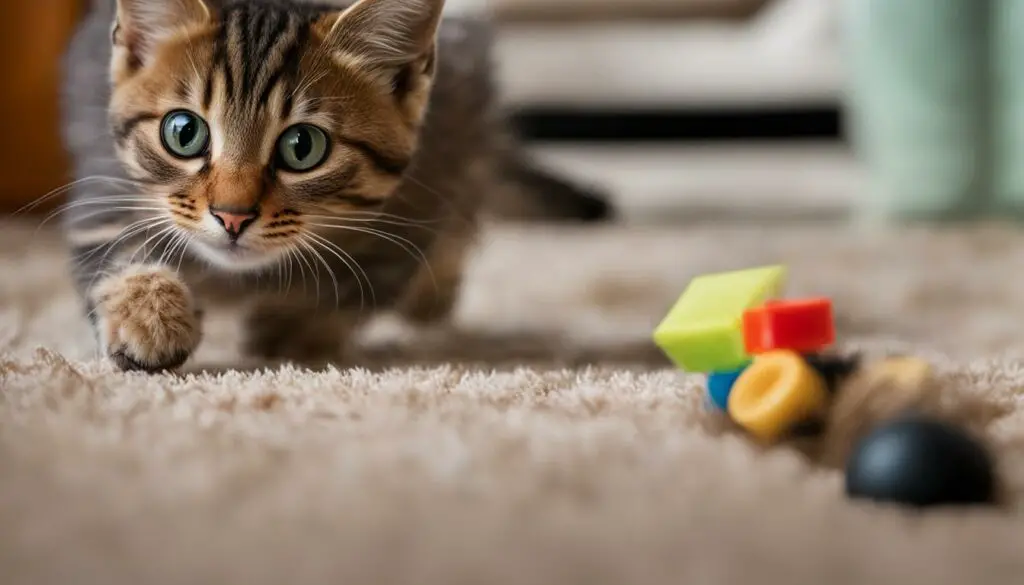
Benefits of Cats’ Hunting Behavior
Understanding cats‘ hunting behavior is essential for cat owners to appreciate the natural instincts and needs of their feline companions. Cats are known as natural hunters, and engaging in hunting activities provides them with various benefits, both physical and mental.
Physical Benefits
Cat hunting behavior offers several physical advantages. Hunting allows cats to exercise, improving their overall fitness and helping to maintain a healthy weight. The physical activity involved in stalking, chasing, and pouncing on prey helps cats develop and maintain strong muscles, joints, and bones. It also improves their coordination and agility, enhancing their overall physical capabilities.
Additionally, hunting behavior provides cats with mental stimulation and enrichment, which is crucial for their well-being. Engaging in hunting activities helps cats to fulfill their natural predatory needs and provides a sense of purpose and accomplishment. This mental stimulation helps keep cats mentally sharp and prevents boredom, which can lead to behavioral issues.
Mental Stimulation and Enrichment
Engaging in hunting behavior allows cats to use their natural instincts and provides mental stimulation and enrichment. Hunting prey, even if it’s just a toy or a simulated activity, allows cats to engage their senses and problem-solving abilities. It provides a challenging and rewarding experience that keeps their minds sharp and active.
By mimicking their natural hunting behaviors through interactive play sessions or providing puzzle toys that require problem-solving, cat owners can enhance their cats’ mental well-being. These activities also foster a deep bond between cats and their owners, as they provide opportunities for interactive play and positive social interaction.
Conclusion
Cats’ hunting behavior is an integral part of their nature, and understanding and appreciating it can lead to a better understanding of their overall well-being. Engaging in hunting activities provides cats with physical exercise, mental stimulation, and fulfillment of their natural instincts. By recognizing and encouraging their hunting behavior in a safe and controlled environment, cat owners can promote their cats’ health and happiness.
| Physical Benefits | Mental Stimulation and Enrichment |
|---|---|
| Exercise and fitness improvement | Opportunity to engage natural instincts |
| Strengthens muscles, joints, and bones | Challenging and rewarding experience |
| Enhances coordination and agility | Keeps minds sharp and active |
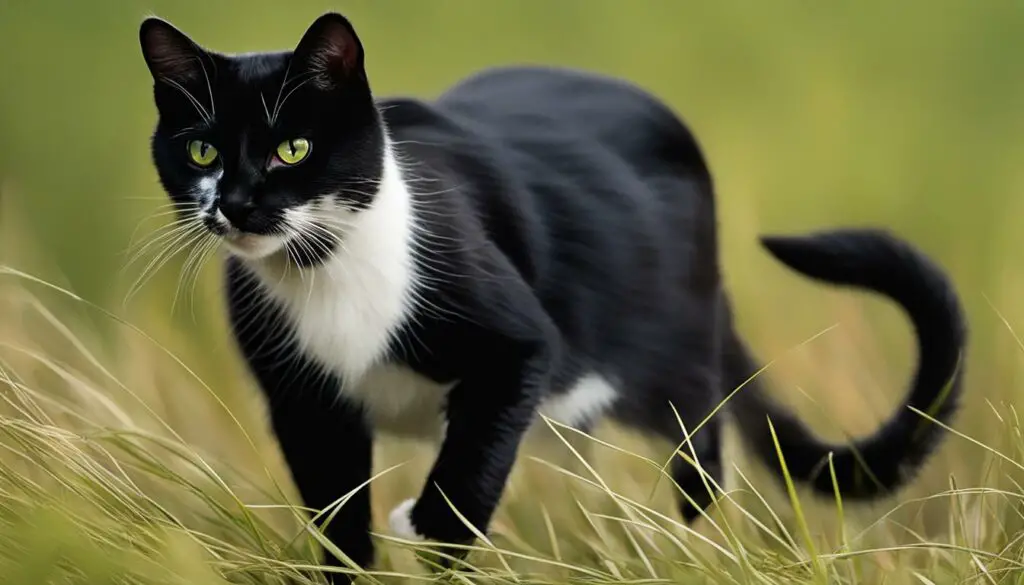
Dealing with Live Mice Caught by Cats
When a cat catches a live mouse, it’s important to handle the situation safely and responsibly. One approach is to isolate the mouse in a contained area and remove the cat to prevent further interaction. This allows for the safe release of the mouse without harm. Additionally, it’s advisable to wear gloves during this process to protect yourself from any potential bites or scratches.
In some cases, you may choose to catch the mouse yourself instead of relying on the cat. This can be done using a humane trap specifically designed to capture small pests like mice. These traps allow you to safely catch the mouse without causing any harm, and then release it outside away from your home.
In situations where you are unable to capture the mouse or prefer to seek professional assistance, contacting a pest control service is recommended. They have the knowledge and expertise to effectively handle the situation and ensure the proper removal of the mouse from your home.
Remember, it’s important to prioritize the well-being of both your cat and the mouse when dealing with live encounters. By following the appropriate steps and taking necessary precautions, you can handle the situation responsibly and ensure a safe outcome for all parties involved.
Cleaning Up After Cat-Mouse Encounters
When your cat catches a mouse but doesn’t kill it, it’s important to clean up the area properly to ensure hygiene and minimize the risk of potential disease transmission. Here are some steps to follow:
- Wear gloves: Before starting the cleaning process, put on a pair of disposable gloves to protect yourself from any potential pathogens that may be present.
- Use disinfectant: Using a disinfectant specifically designed for cleaning surfaces, thoroughly wipe down any areas or items that the mouse may have come into contact with. Pay close attention to areas such as countertops, floors, and furniture.
- Dispose of contaminated items: If any items, such as bedding or toys, have been contaminated by the mouse, it’s best to dispose of them properly to avoid any potential risks of disease transmission.
By following these steps, you can ensure a clean and safe environment for both you and your cat. It’s essential to prioritize hygiene when dealing with cat-mouse interactions to prevent any potential health issues.

Table: Cleaning Products for Cat-Mouse Encounters
| Product | Description |
|---|---|
| Disinfectant spray | A powerful spray that kills germs and bacteria on surfaces, ideal for wiping down areas contaminated by mice. |
| Vinegar solution | A natural alternative to harsh chemicals, a solution of vinegar and water can be used to disinfect and deodorize surfaces. |
| Disposable gloves | A pair of latex or nitrile gloves to protect your hands from potential pathogens when cleaning contaminated areas. |
| Paper towels | Disposable paper towels are convenient for wiping down surfaces and can be easily discarded after use. |
“Proper cleaning after a cat-mouse encounter is crucial for maintaining a clean and healthy environment for both you and your furry friend.”
It’s important to note that if you have any concerns about potential health risks or if your cat shows any signs of illness after interacting with a mouse, it is recommended to consult a veterinarian for further guidance and advice. They can provide expertise on preventive measures and address any potential health issues that may arise. By taking proactive steps and ensuring proper cleanliness, you can create a safe and hygienic living space for you and your cat.
Safety Precautions for Cat Owners
As cat owners, it’s important for us to take certain safety precautions when it comes to our feline friends’ hunting instincts and their interactions with mice. Understanding the behavior of cats and the potential risks involved can help us ensure the well-being of both our cats and ourselves.
H3: Wearing Gloves for Protection
One important safety measure is to wear gloves when handling mice that your cat has caught. This is especially crucial if you have any concerns about the health and hygiene of the mouse. Gloves can protect you from potential diseases and parasites that the mouse may carry, reducing the risk of transmission.
H3: Monitoring Your Cat’s Behavior
It’s also essential to monitor your cat’s behavior after an interaction with a mouse. Look out for any signs of illness or unusual behavior, such as excessive vomiting, diarrhea, or lethargy. If you notice anything concerning, it’s best to consult a veterinarian promptly for assistance and guidance.
H3: Consulting a Veterinarian
If you have any concerns about your cat’s hunting behavior or the potential risks associated with it, don’t hesitate to reach out to a veterinarian. They can provide valuable insights, advice, and preventive measures to ensure your cat’s safety and well-being. They may also recommend appropriate vaccinations or treatments to protect your cat from any diseases that could be transmitted through hunting activities.
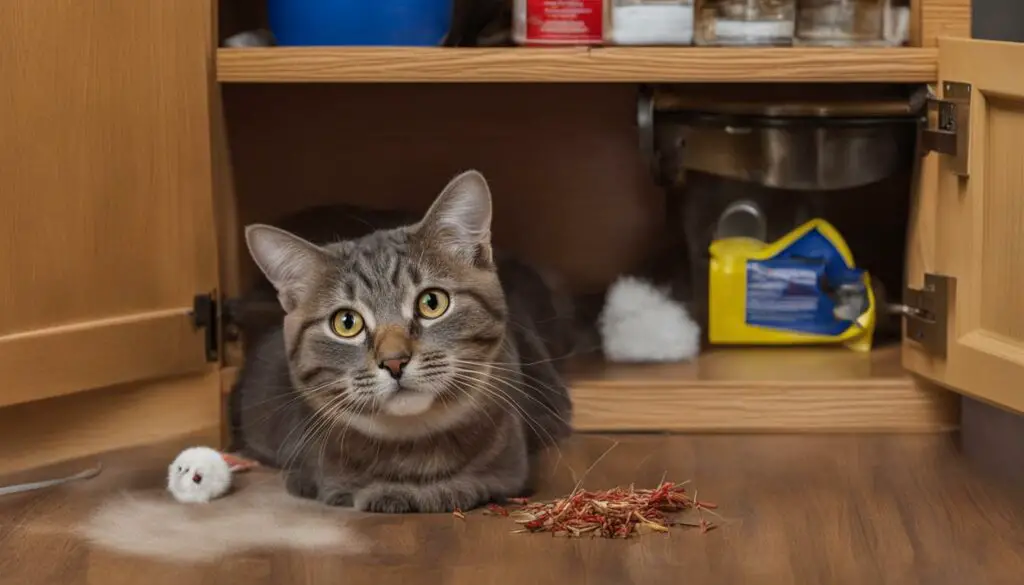
By following these safety precautions, we can promote a harmonious and safe environment for our cats and ourselves, allowing them to engage in their natural hunting instincts while minimizing any potential risks.
Understanding Cats’ Hunting Instincts
When it comes to understanding why cats catch mice but don’t always kill them, it’s important to delve into their feline hunting instincts and natural behaviors. Cats are true predators, with a long history of hunting and capturing prey. This instinctual behavior is deeply rooted in their DNA and has been shaped by generations of survival in the wild.
Cats have an innate drive to chase, pounce, and play, honing their hunting skills and keeping their predatory instincts sharp. When a cat catches a mouse but doesn’t kill it, it could be a result of their playful nature and the desire to engage in the thrill of the hunt rather than focusing solely on the act of killing. This behavior allows cats to satisfy their hunting instincts while also enjoying the interactive aspect of the chase.
Each cat has its own unique personality and preferences, which can influence their hunting behavior. Some cats may choose not to kill mice out of a sense of mercy or simply because they derive satisfaction from the chase itself. For these cats, it’s more about the experience rather than the end result. Stray or feral cats, especially those that have had to rely on hunting for survival in the past, may also exhibit non-lethal interactions with mice as a way to relive their wild experiences.
Understanding cats’ hunting instincts can help cat owners navigate and appreciate their feline companions’ natural behaviors. By providing appropriate outlets for their hunting needs, such as interactive toys and play sessions, owners can help cats satisfy their instincts while minimizing potential harm to prey animals. It’s important to observe and respect each cat’s individual behavior and preferences when it comes to hunting, ensuring a safe and enriching environment for both cats and their potential prey.
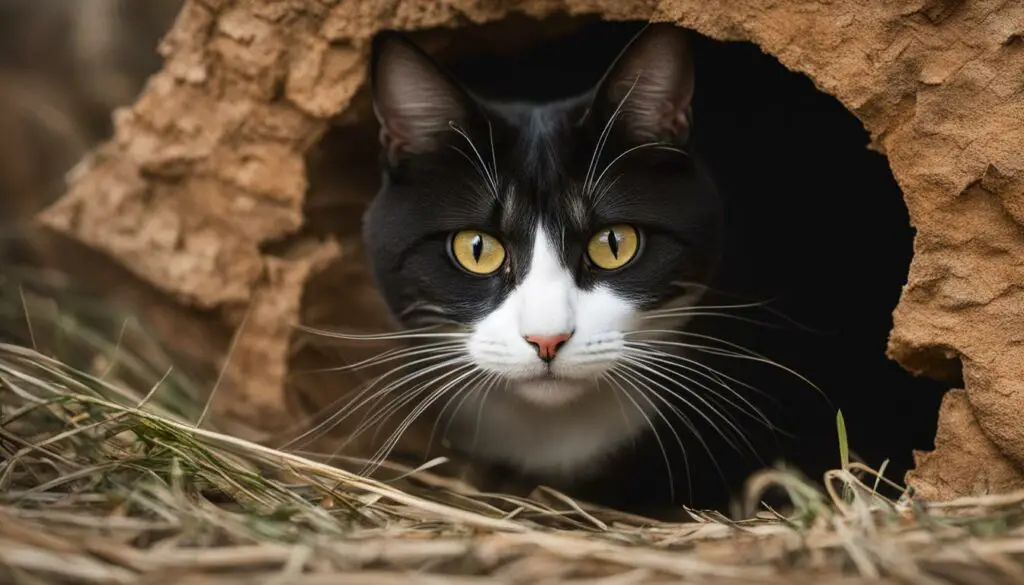
Table: Factors Influencing Cats’ Hunting Behavior
| Factors | Description |
|---|---|
| Wild Ancestry | Cats’ hunting instincts are deeply rooted in their wild ancestry. Their predatory behavior has been honed over generations of survival in the wild. |
| Playful Nature | Cats have a natural inclination for play, and their interactions with mice can be seen as a form of playful behavior rather than solely predation. |
| Individual Personality | Each cat has its own unique personality, which can influence their hunting behavior. Some cats may choose not to kill mice based on their personal preferences. |
| Past Experiences | Stray or feral cats that have had to rely on hunting for survival may exhibit non-lethal interactions with mice as a way to relive their wild experiences. |
Managing Cat-Mouse Encounters
When it comes to cat-mouse interactions, managing the situation requires careful consideration of the well-being of both your cat and the mouse. While some cats may catch mice without intending to harm them, others may engage in non-lethal play behavior. Here are some tips for managing cat-mouse encounters in a humane and responsible manner:
Creating a Safe Environment
To ensure the safety of both your cat and the mouse, it’s important to create a safe environment for their interactions. Consider providing your cat with alternative toys and activities that simulate hunting, redirecting their natural instincts away from mice. This can help prevent potential harm to the mouse while still satisfying your cat’s need for play and stimulation.
Supervising Outdoor Encounters
If your cat spends time outdoors where mice may be present, it’s essential to supervise their activities. Keep a close eye on your cat’s behavior and intervene if necessary to prevent them from killing or injuring the mouse. Redirect their attention to other activities or toys to ensure a non-lethal encounter.
Safe Release of Live Mice
If your cat has caught a live mouse indoors, it’s important to handle the situation safely and responsibly. One approach is to isolate the mouse in a contained area, such as a box, and remove your cat from the vicinity. This allows for the safe release of the mouse without causing harm. Remember to wear gloves during this process to protect yourself from potential bites or scratches.
By managing cat-mouse encounters in a non-lethal and responsible way, you can ensure the safety of both your cat and the mouse. Providing alternative outlets for your cat’s hunting instincts and supervising outdoor activities can help prevent harm to prey animals while still allowing your cat to engage in natural behaviors.
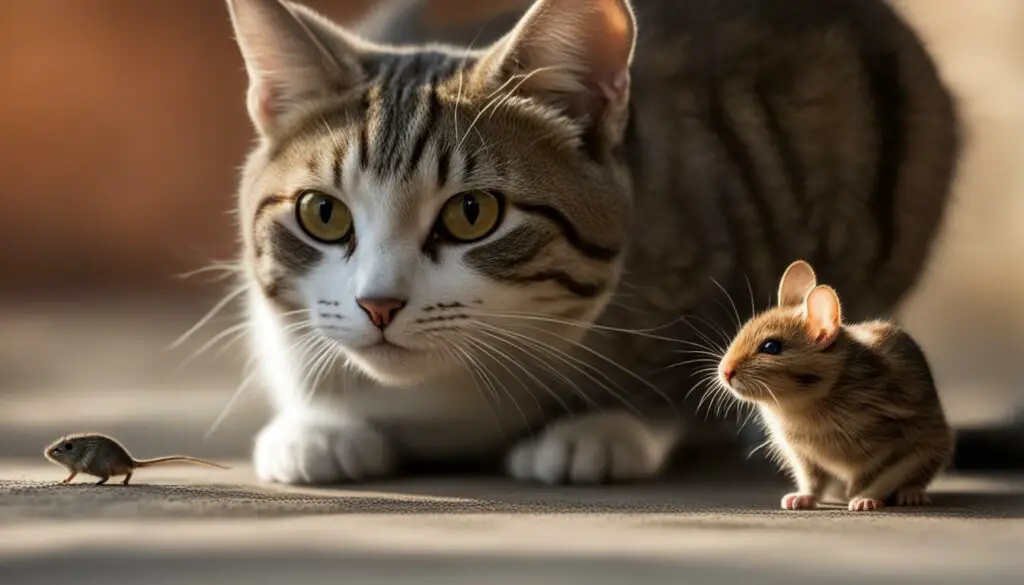
Conclusion
As a cat owner, I have often wondered why my cat caught a mouse but didn’t kill it. Through my research, I’ve come to understand that this behavior is influenced by various factors, including feline hunting instincts and individual cat behavior.
Cats are natural hunters, and their instincts drive them to chase and capture prey like mice. However, not all cats choose to kill the mice they catch. Some cats engage in playful interactions with their prey, satisfying their hunting instincts without causing harm.
Each cat has its own unique behavior and preferences, so it’s important to recognize that not all cats will exhibit the same response to catching a mouse. Some cats may simply enjoy the thrill of the chase and play with the mouse without intending to kill it.
Understanding cats’ hunting instincts can help us better manage cat-mouse interactions. By providing alternative toys and activities that simulate hunting, we can redirect their natural instincts in a safe and enjoyable way. Remember, each cat-owner relationship is unique, so finding a balance that ensures the safety and happiness of both your cat and any prey animals involved is key.
FAQ
Why did my cat catch a mouse but didn’t kill it?
Cats have a playful nature, and their interactions with mice can be seen as a form of play. They may enjoy the thrill of the chase and play with the mouse without causing harm.
What influences a cat’s decision to not kill a mouse?
Each cat has its own unique behavior and preferences. Factors such as personality, upbringing, and previous experiences can influence a cat’s decision to engage in non-lethal interaction with a mouse.
Why do some cats choose to play with mice instead of killing them?
Cats may opt for non-lethal play with mice as a way to satisfy their hunting instincts without the need to kill. This can provide mental and physical stimulation for cats.
Can stray cats still exhibit hunting behavior?
Yes, stray cats may have had to rely on hunting for survival and may still retain their hunting skills. They may choose not to kill mice they catch as a way to relive their wild experiences.
What are the potential reasons for a cat not killing a mouse?
Cats may not have learned the skill of killing mice and may be more interested in playful interaction. Some cats may also exhibit a more humane hunting behavior, catching prey without causing harm.
Why do cats play with mice instead of killing them?
Cats may be aware that mice can carry diseases and parasites, which could influence their decision to play with mice instead of killing them. They may prioritize their health and avoid consuming potentially infected prey.
How can I redirect my cat’s hunting instincts?
Providing cats with alternative toys and activities that simulate hunting can help redirect their natural instincts. This can satisfy their hunting needs in a safe and controlled manner.
What are the benefits of cats’ hunting behavior?
Hunting allows cats to exercise, improve their coordination and agility, fulfill their natural predatory needs, and provide mental stimulation. It can also prevent boredom.
How do I handle a live mouse my cat caught?
One approach is to isolate the mouse in a contained area and remove the cat to prevent further interaction. This allows for the safe release of the mouse without harm.
How should I clean up after a cat-mouse encounter?
When cleaning up, wear gloves and use disinfectant to clean surfaces or items that the mouse may have come into contact with. This helps minimize the risk of potential disease transmission.
What safety precautions should I take as a cat owner?
It’s important to wear gloves for protection, monitor your cat’s behavior for signs of illness, and consult a veterinarian if necessary. Educating yourself about feline hunting instincts can also aid in effectively managing cat-mouse encounters.
How can I better understand my cat’s hunting instincts?
Learning more about their natural behaviors and the role hunting plays in their overall well-being can help you understand your cat’s hunting instincts. This knowledge can also help you effectively manage encounters with mice.
How should I manage cat-mouse encounters?
The approach to managing cat-mouse encounters will depend on various factors. It’s important to consider the well-being of both your cat and the prey animals involved. Finding a balance that ensures safety and happiness for all parties is essential.

